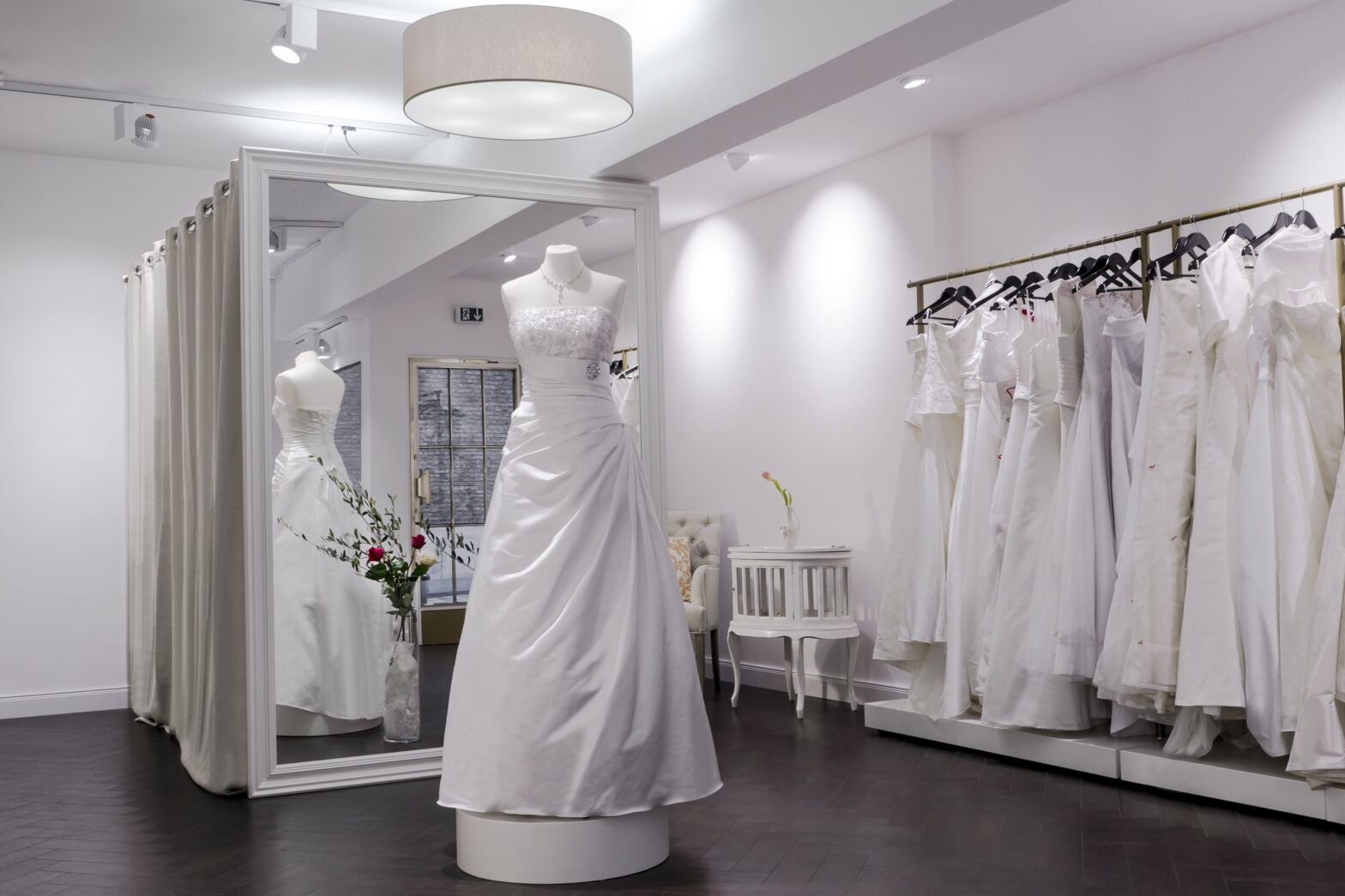As wedding season approaches smaller bridal boutiques will be hoping to find ways to attract custom to them and away from larger brands. Here are some pointers.
1. Get your finances in order
A key consideration for any business is to plan your budgets well in advance: make allowances for staffing, overheads, marketing, stock rotation and technology updates (not to mention about a million other things businesses have to provide for in their cash flow). Being able to lay all this out on a simple spreadsheet is invaluable and can reveal insights which might show that you are excelling in one area but falling short in another. Being able to see a projected cash flow for the next 12 months is extremely helpful as it can highlight both problem months and boom months where you will be able to invest capital to grow your business. Having this budget in place in advance will give you time to seek financial support if needed, such as a small business loan, which could help get you over any bumps in the road. Alternatively, it would enable your business to make the most of that bumper month income to expand the company sooner than expected, take on a member of staff to help, or invest in essential stock and equipment.
2. Advertising and promotion: choosing the right channels
Choosing the right channels in which to advertise and spend your precious time and money is imperative; it can mean the difference between a fantastic season or simply breaking even. Here are some channels for you to consider:
Bridal magazines
With so many bridal magazines on the market these days, it can be baffling deciding which one to advertise in. Print advertisements in magazines also tend to be expensive so, to help make your choice easier, think about narrowing down the places you advertise based on the type of client you want to attract. Are they local, and therefore a countywide publication would suit? Would they consider themselves ‘Alternative’ brides?
Once you’ve made your decision on which magazine(s) to use, you’ll need to measure the impact of your advertising. One low tech and easy way to measure this is to simply ask your clients, either in person, on a comment card or as part of a post-sale email survey: ’where did you hear about us?’. A slightly more tech savvy way is to create a unique URL for the print advert you place which can then be tracked through Google Analytics. This will give you a solid and measurable result for each piece of print advertising you place.
Get listed as a stockist on supplier’s sites
Supplier’s sites can be an incredibly lucrative outlet as brides to be will often trawl these sites looking for ideas. Not only do supplier sites list businesses by type, but also by location, so you can tap into two streams of revenue: local weddings and those looking for a particular skill you have.
Local advertising
Local advertising covers a number of avenues from beauty and fashion features in a local newspaper or glossy supplement, to a new business announcement with special open days offering discount and vouchers. This is an opportunity to get the local population through the doors of your shop; once they’re there you can build that relationship with them, which could mean even if they aren’t in need of your services straight away they may well come to you when they are. Building brand loyalty is crucial.
Editorial style features in local publications will be very beneficial as these won’t read as adverts, but will subtly influence readers by lending an air of reliability to your brand.
Social media
The proliferation of visual social media networks, such as Instagram and Pinterest, beg to be used for businesses like wedding boutiques. Inspirational or aspirational images posted with links to your shop or website can increase traffic to your online store, which you can then convert to real world sales.
Remember that the point of social networks is to create a community. Interact with your followers, follow them back, comment on their pictures and don’t forget to use the most profitable hashtags on all your images, or else how will anyone find them?
Instagram isn’t without its pitfalls; choosing the right type of images to portray your brand is critical. Everyone has seen the Instagram cliché of feet at the beach or a lovely coffee cup. Don’t be that person.
Instagram is about promoting your business at its absolute unique best, so your images should reflect that. Pictures that include faces get 38 per cent more likes than those without, so gorgeous pictures of brides in full regalia, and couples posing together will perform well. Consider colour and composition; some of the most popular brands on the ‘gram opt to keep all their images to one colour pallet or style all their images in a similar way, such as very white minimalist backgrounds or conversely predominantly black or dark backgrounds. Play around beforehand and find what works best for your style/products, and then try to keep as many images as possible on theme.
Be mindful of how frequently you post, 1-3 times a day is more than enough for most people, otherwise you’ll saturate your follower’s feeds and turn them off.
If you work with other suppliers (stock designer wedding dresses, favours or handmade items) then be sure to tag them in your posts; use their @ handle to notify them that you’re promoting their products through your posts and you will often find they like or repost your images. This is an effective strategy for growing your audience and making connections.
The best wedding hashtags to use regularly include: #weddingwednesday #weddingday #weddingideas #bridalthings #instabride #realweddings #protip #instawedding
Wedding features
Another way to try to gain brand and product exposure is to encourage newlyweds to submit their wedding photo set to magazines or wedding blogs. This has become an incredibly popular pastime for couples since the boom of online wedding guide sites like Rock n Roll Bride, Rock My Wedding and Before the Big Day. Wedding websites with links back to your online store are invaluable as they will increase web traffic and improve search engine rankings for you.
Plus, when a customer submits their wedding story to a wedding blog which features your item, you’ll not only gain coverage, you’re also getting an impartial referral from the brides themselves.
3. Interior design and branding
One notable advantage wedding boutiques have over larger brands is the ability to personalise their shop to make it stand out from big, bland corporations. If you are a business specialising in vintage dresses then fill your shop with quirky vintage finds and period furniture. If you’re a cake shop that caters to rock and roll brides then decorate your premises with band posters or funky cake stands and display your cakes on top of old vinyl records.
Whatever it is that you do, building the right look within your store can set you apart and means that your clients feel cosseted and unique. Cultivating a high level of customer service is worth its weight in gold as customers often vote with their wallets and feet: 78 per cent of consumers have reneged on a transaction or not made an intended purchase because of a poor service experience. Making your shop wonderful isn’t a standalone job though, the work you do on the structural or aesthetic aspects of your store should be replicated for your website and social media channels too. Keep the whole thing clean and in line with a clear brand message.
4. Establish and relish your niche
Wedding businesses are becoming a huge industry now and it pays to take time to think about what kind of a company you want to be. Are you suited to luxury loving brides? Vintage theme events? Alternative couples? Knowing your target audience can help you establish yourself as unique and set you apart as a company to be trusted.
Related: Starting a business in the wedding industry
There are publications and websites for every type of ceremony, so do your research and find your niche. Once you’ve done that you can set about being the best in your area of expertise.





